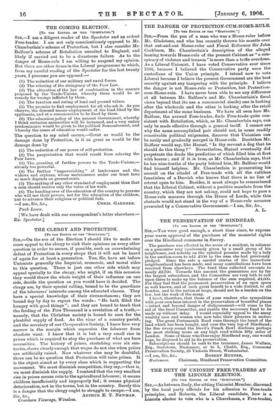THE CLERGY AND PROTECTION.
[To ms EDITOR OF THE "SPECTATOR."]
Sin,—On the eve of the Election I should like to make one more appeal to the clergy to sink their opinions on every other question in order to secure, if possible, such an overwhelming defeat of Protection in every shape that it will not be heard of again for at least a generation. You, Sir, have set before Unionists generally the Imperial, economic, and moral sides to this question. There is just one other side which may appeal specially to the clergy, who might, if on this occasion they would throw the whole weight of their influence on one aide, decide the question as you would have it decided. The clergy are, by their special calling, bound to be the guardians of the labourers' interests among the educated classes. They have a special knowledge of their circumstances ; they are bound day by day to repeat the words : "He hath filled the hungry with good things "; and they are bound to teach that the feeding of the Five Thousand is a revelation of a truth,— namely, that the Christian society is bound to care for the plentiful supply of food. As the vicar of a country parish, and the secretary of our Co-operative Society, I know how very narrow is the margin which separates the labourer from absolute want. I know that it is but a very small rise in prices which is required to stop the purchase of what are bare necessities. The history of prices, stretching over six cen- turies, shows clearly enough that wages do not rise when prices are artificially raised. Now whatever else may be doubtful, there can be no question that Protection will raise prices. It is the object aimed at by every class which is supporting the movement. We must diminish competition, they say,—that is, we must diminish the supply. I contend that the very smallest rise in prices means ruin to the agricultural labourer; it means children insufficiently and improperly fed ; it means physical deterioration, not in the towns, but in the country. Surely this is a danger that the clergy ought to struggle to escape.—I am, Cranboro Vicarage, Winslow.


















































 Previous page
Previous page